
Bobby Valentine in 2004. (ⒸSANKEI)
Bobby Valentine’s recently released memoir is a detail-rich trip down memory lane for one of pro baseball’s most unforgettable characters of the past 50 years.
Vivid recollections of games from his childhood to his most recent managerial job, leading the Boston Red Sox in 2012, are shared in Valentine’s Way: My Adventurous Life and Times (Permuted Press; November 2021). An insider’s tales about epic disputes and lifelong friendship also enrich the 376-page tome.
Valentine and collaborator Peter Golenbock, whose many notable books include The Bronx Zoo (1979), authored with New York Yankees reliever Sparky Lyle, capture the athleticism, charisma, energy and iconoclastic ways that defined Bobby V’s years as a baseball player, coach and manager. The book is funny and thoughtful, highlighting different aspects of Bobby V’s personality.
Before the bulk of this memoir covers his years in Major League Baseball, it introduces Valentine’s family, his upbringing in Stamford, Connecticut, and his rise to fame as a standout high school athlete in baseball and football.
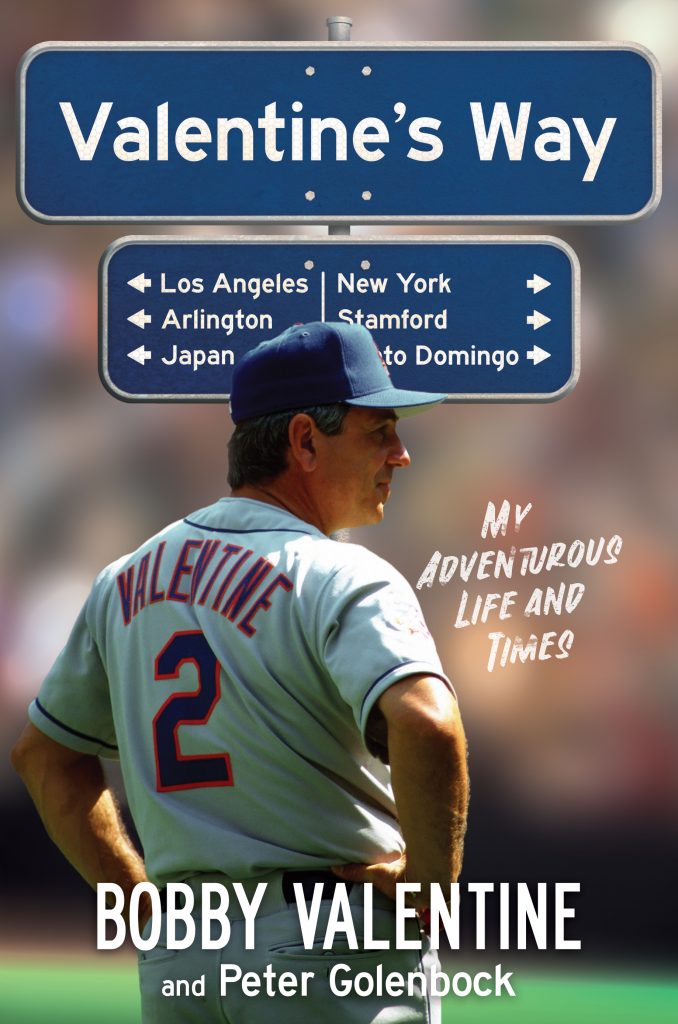
Of the 35 chapters, four are devoted to his two stints as manager of the Chiba Lotte Marines (1995 and 2004-09): “A Year in Japan,” “A Return to Japan,” “Bobby Magic” and “Japan League Champions.” And those four chapters provide a solid primer on Japanese baseball and the nation’s team sports culture as a whole.
Bobby V was successful and proved that always sticking to traditional practices or what was done by your predecessor isn’t always the best approach. Numerous examples of how he shook things up with the Marines and did things his way fill the pages of the four chapters about his seven seasons with Chiba.
How Valentine Wound Up with the Marines
It was interesting to learn how Bobby V appeared on the radar of the Marines in the first place.
What led to his landing a job with the Chiba Lotte Marines, a franchise that had finished in fourth, fifth or sixth place in the Pacific League in 30 of the previous 31 seasons?
A prominent baseball man decided to think outside the box.
Like Valentine, Tatsuro Hirooka was a baseball lifer as a star shortstop for the Yomiuri Giants, playing alongside all-time greats Sadaharu Oh and Shigeo Nagashima. He later won a trio of Japan Series titles as a manager, two with the Yakult Swallows (1978 and ’82) and another with the Seibu Lions (1983). Fast forward to 1994, and Hirooka is the general manager of the Marines.
“I didn’t know it at the time, but [Hirooka] … had come to the United States for the express purpose of hiring a manager who wasn’t a Japanese national,” Valentine writes.
At the time, Valentine was managing the Norfolk Tides, the New York Mets’ Triple-A affiliate (his managerial gig after leading the Texas Rangers from 1985-92), and Hirooka kept a close eye on Bobby V, attending approximately 15 Tides games in several cities that season.
Hirooka impressed Valentine as a keen observer, one with endless curiosity about every aspect of baseball strategy.
“He took amazing notes, and then we’d have dinner and he’d ask me a series of questions about why I made the moves I’d made during the games,” Valentine recalls. “Other than Tommy Lasorda, Hirooka-san was the most well-rounded baseball person I was ever around.”
Hirooka made a job offer to Valentine, the first American player in MLB to wield a Mizuno glove, giving him the chance to take over as Lotte manager in 1995. He accepted.
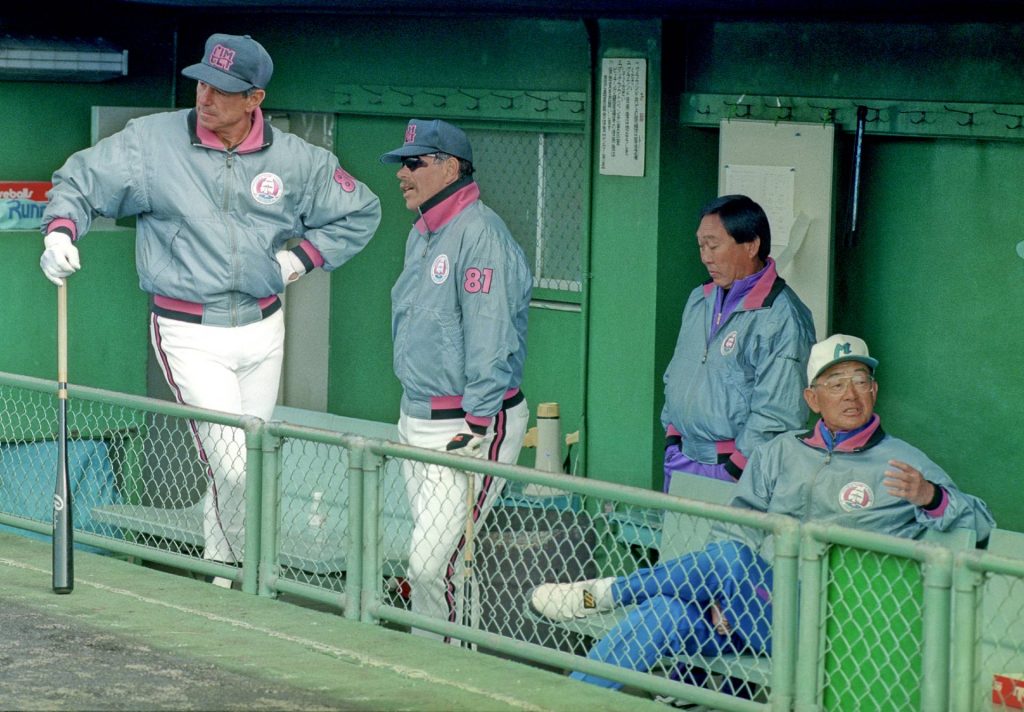
The Marines were transformed into a better all-around club under Valentine than they’d been in 1994 (55-73-2) under Soroku Yagisawa and Futoshi Nakanishi.
In 1995, Valentine’s Marines went 69-58-3, finishing in second place in the Pacific League.
Not surprisingly, there were philosophical clashes, with Hirooka and the team’s Japanese coaches holding particular views on how to run the show that differed from Bobby V’s ideas.
“I had a two-year contract, and toward the end of the first season, Hirooka-san and I were having disagreements about my resting of players,” Valentine notes. “We had this long stretch during the hot summer without many off-days. The weather was ridiculously hot, and when we finally got an off-day, I told the team, ‘There will be no practice tomorrow on the off-day.’
“The elder statesmen on the team whom I spoke to about it said he thought it would be OK. Some were thankful. The next day, the ‘off’ day, I walked out to the stadium to get my bicycle. I was taken aback when I saw the team was on the field with Hirooka-san leading the practice.”
In retrospect, Valentine realized the problem. "My choosing to give the players an afternoon off became a media circus,” he writes. “I was challenging the samurai mentality of the Japanese culture.”
Valentine didn’t return as Marines manager in 1996, though 20,000 fans signed a petition in three days pleading for him to return.
“In one year, the fans and I had really connected,” Valentine recalls. “I had a fan-friendly policy for my players, and it really resonated.”
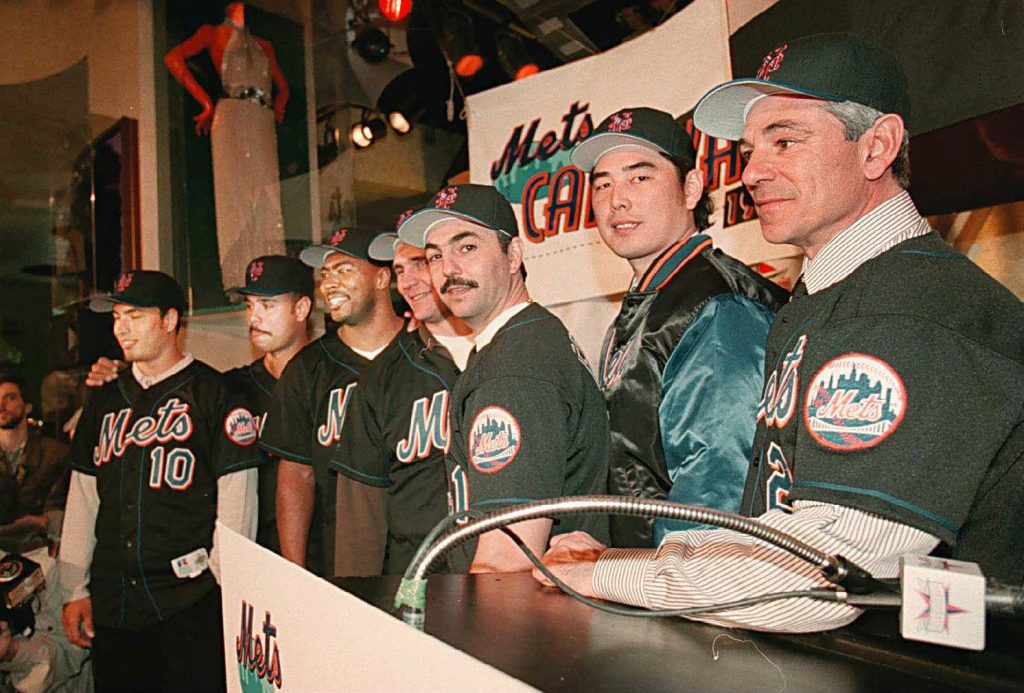
Instead, he went to work for the New York Mets organization again. Promised the job as skipper of the top squad, he wound up as the manager-in-waiting for the Big Apple gig (to replace Dallas Green) while guiding the Norfolk Tides for the spring and most of the summer before replacing Green with 31 games remaining in the regular season.
Valentine had success with the New York Mets, leading them to the World Series in 2000 against the crosstown Yankees. He enjoyed the second-longest managerial gig of his career with the Mets (1996-2002) before he was dismissed.
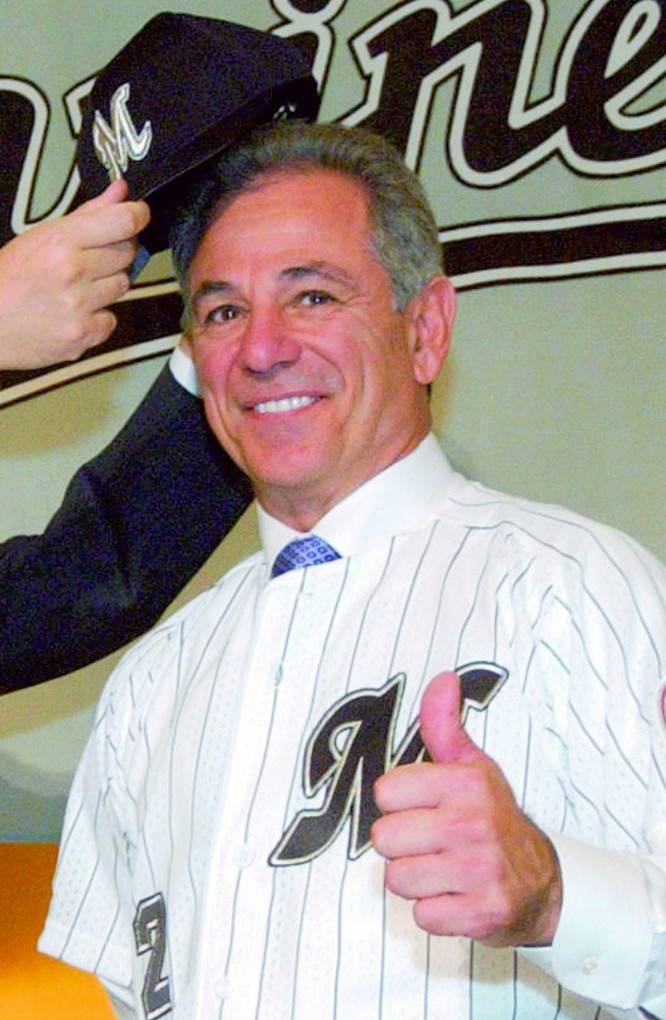
A Second Stint with the Marines
What led to Bobby V’s second stint with the Chiba Lotte Marines could be viewed as a mere coincidence or as something secretly orchestrated by someone who knew his whereabouts in October 2003.
Having lunch with a friend at Four Seasons in Manhattan, a famous eatery he’d never been to, a man approached Bobby V and said, “What a coincidence that we are having lunch in the same restaurant.”
Who was it? Akio Shigemitsu, the acting owner of the Marines.
The book quickly cuts to the chase after the business mogul introduced himself.
“Would you consider coming back and managing the Marines again?” the baseball executive said.
“I’d love to do that,” Valentine replied. “How about a handshake?”
In November 2003, Valentine flew back to Japan, where he was greeted by thousands of Japanese fans at the airport.
Reflecting on his leadership style in 1995 and how he wanted to adjust his approach in 2004, Valentine writes: “One thing I learned when I was there in 1995 was that what they were doing before I arrived was damn good. What I needed to figure out was how to fine-tune it, how to bring an individual approach that might enhance it. So when I came back in 2004, that was the entire challenge: not to tell anyone what to do but to try to figure out how everyone should be doing what was best for success.”
Bobby V came to recognize that he was an outsider, even though he was recruited to be the club’s dugout boss.
This recognition is one of the book’s most compelling points.
“A couple of my Japanese coaches were challenging and weren’t loyal. But that was nothing in comparison to the Japanese baseball world and Japanese society itself — the last thing in the world they wanted was for me to succeed,” Valentine reveals. “Japan has always been a closed society. Baseball and sumo wrestling are their sacred sports. I was entering their world. I was the minority. I was the one who stuck out in a society in which no one stuck out.
“Back in 1995, there were a lot of things I wanted to force-feed. I wanted to make sure everyone knew what I knew, until I realized they didn’t care what I knew, didn’t give a damn what I knew — until they first knew that I had come to Japan to do something for the team, the baseball community, and maybe even Japanese society.”
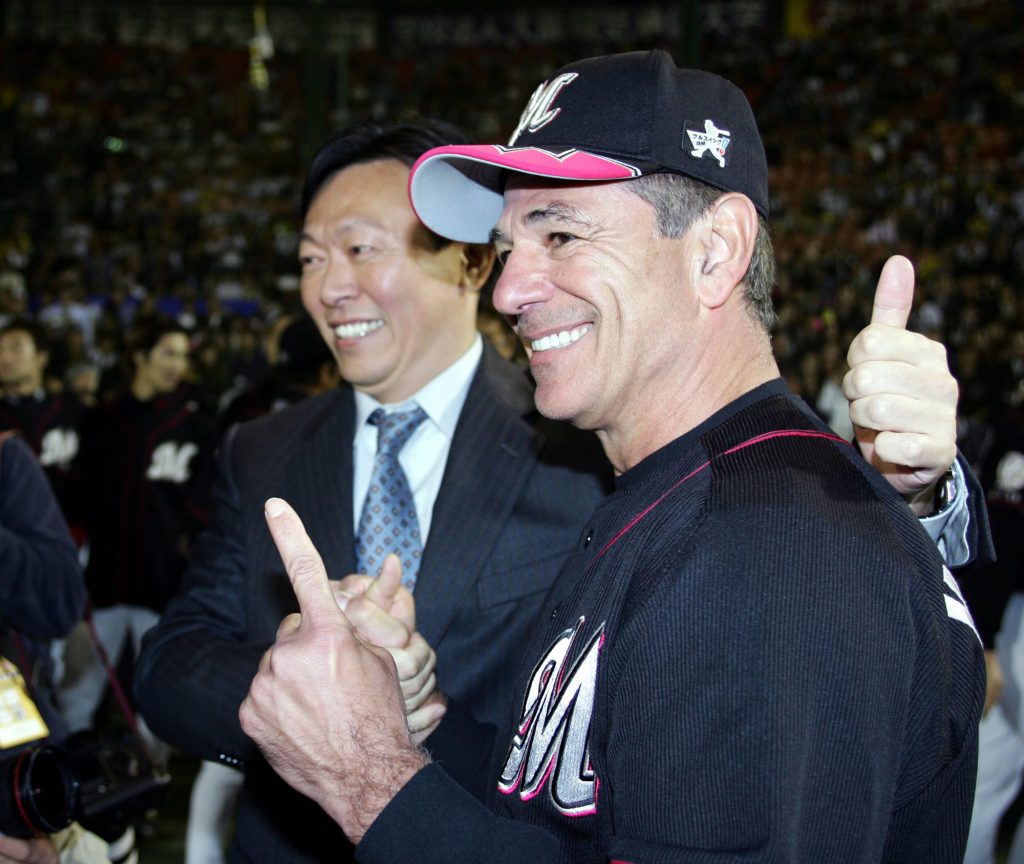
Valentine was a hands-on manager, an innovative figure within the staid structure of Nippon Professional Baseball, shaking up the status quo. And, as the book explains, the Marines created attention by doing things differently during Bobby V’s years, especially in his second stint.
For example, he looked into the possibility of holding spring training in Australia in 2004, a break from the norm. Ownership approved, and the team held camp in Geelong, Australia.
Equally significant to the daily workouts and thorough preparation for the regular season was how the experience resonated with the entire organization, according to Valentine.
“I convinced the ownership to rent a 747 and take everyone there,” Valentine points out, adding that “I thought it was a great way to show the players that they were special.”
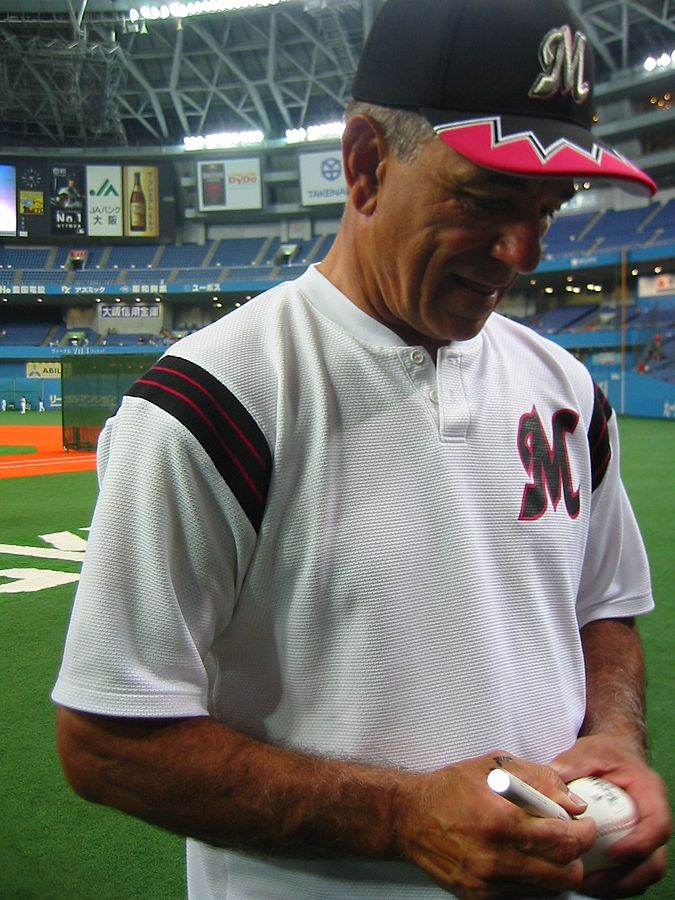
Another noteworthy aspect of Valentine’s leadership was helping shape the team’s plan to make every Marines game a potpourri of activities for fans.
He explains: “We were a destination location with a stand-alone stadium, so we started doing things for the fans before and after the games. We had the kids run the bases on the field, which had never been done before. The parents came down on the field to get their pictures taken with the players, and they were able to get autographs. That had never happened before. … Before and after games, we set up a karaoke stage outside the stadium, where players would make special appearances and sing their favorite songs with fans.”
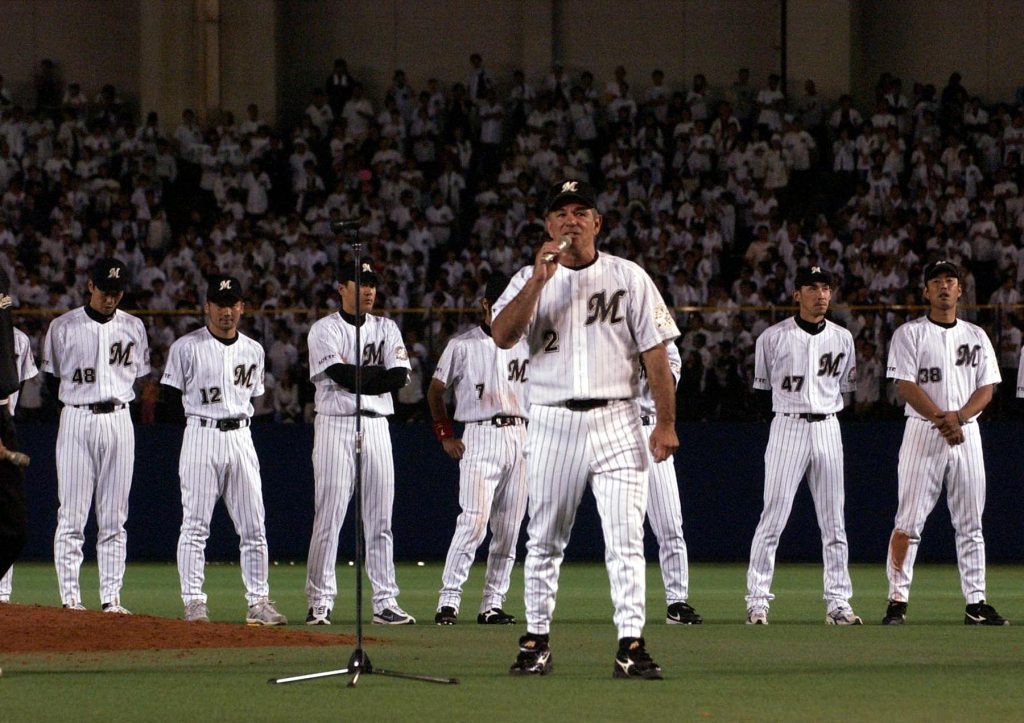
Developing into Champions
While the Marines were becoming a more fan-friendly entertainment option, the team was developing into a contender.
The 2005 team featured a strong balance of up-and-coming players and established veterans, and Valentine deftly managed the lineup and player substitutions.
As a vocal leader, he was unafraid of speaking out when he felt he had to.
The book illustrates this point at a crucial juncture in the 2005 playoffs. The Marines had swept the Seibu Lions 2-0 in the first stage of the Climax Series, then taken a 2-0 lead over the Fukuoka SoftBank Hawks in the final stage. But the Hawks stormed back, winning Games 3 and 4.
In an attempt to defuse the pressure-filled mood hanging over his team, Valentine called for an impromptu meeting after Game 4, requesting that his players didn’t leave the dugout.
Instead, the team gathered with him in a big circle.
Like Tommy Lasorda, his longtime mentor in the Los Angeles Dodgers organization, Bobby V took pride in motivating his players.
And he gave a powerful speech: “ ‘Domo, domo, domo (Thank you, thank you, thank you),’ I said. “ 'This is the most exciting time I have ever had in my lifetime, and because we lost this game, it gives us an opportunity to play Game 5, the game I’ve been looking forward to this entire season, the one that will determine who the Pacific champions are going to be. We are lucky enough to have this opportunity tomorrow, right here in the Fukuoka Dome, so I thank you guys for giving me the opportunity, and you should feel that you are the luckiest people in the world to be enjoying this moment with me.' ”
It was the right thing to say at the time, and insider stories like this one enrich the narrative of this enjoyable book.
The Marines won Game 5, 3-2, scoring twice in the eighth inning to pull ahead, earning a trip to the Japan Series.
Days later, the Marines captured the 2005 NPB title with a four-game sweep of the Hanshin Tigers.
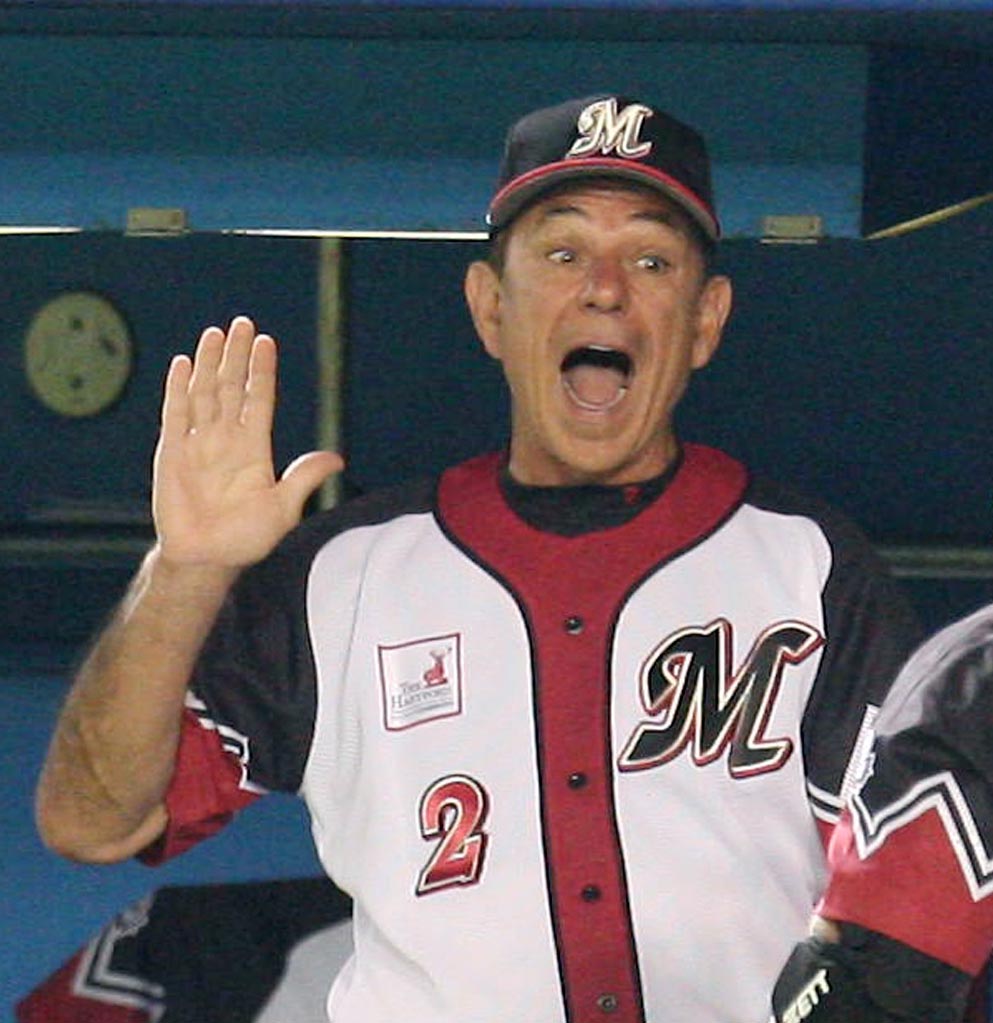
Bobby Valentine began playing baseball in the early 1950s. And eight decades later, details of how it felt to reach the Japan Series elevate this book from a run-of-the-mill memoir to one of luminous quality.
This Connecticut-born baseball icon experienced the ultimate thrill in NPB, with the journey of leading the Marines to the franchise’s first title since 1974, when it was known as the Lotte Orions. But before Game 1 against the Tigers was played in Chiba, the melding of Eastern and Western cultures brought an eye-opening experience for Valentine. It happened during the doage (traditional victory toss) after the final game against the Hawks.
“In this symbol-conscious country, this ritual showed that in order to win a championship, you need two things: trust and teamwork,” Valentine relates. “During the season, the team needs to trust the manager. And after the victory, the manager knew the players had the teamwork to throw him into the air, and he had the trust that they would catch him.
“While I was in the air, I was in the most relaxed state I had ever been in in my life. I was smiling so broadly. [Left fielder Jun] Inoue had given me the game ball, and I was holding it in my hand as I was being tossed up and down. My feet were together. My hands were in the air, and it was as fine a feeling as I had ever experienced in or out of a uniform.”








